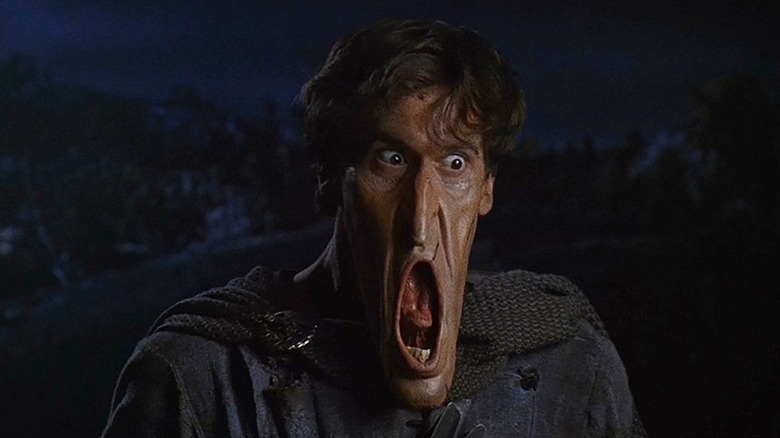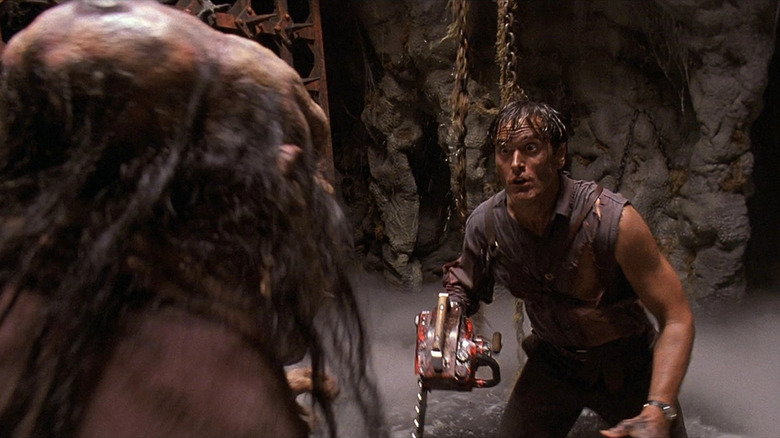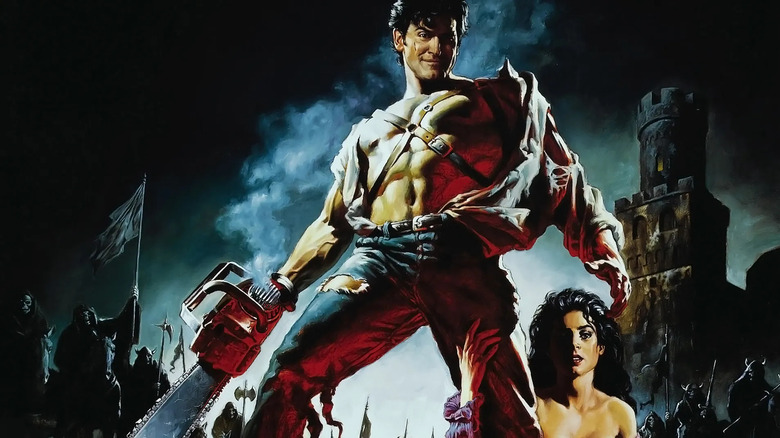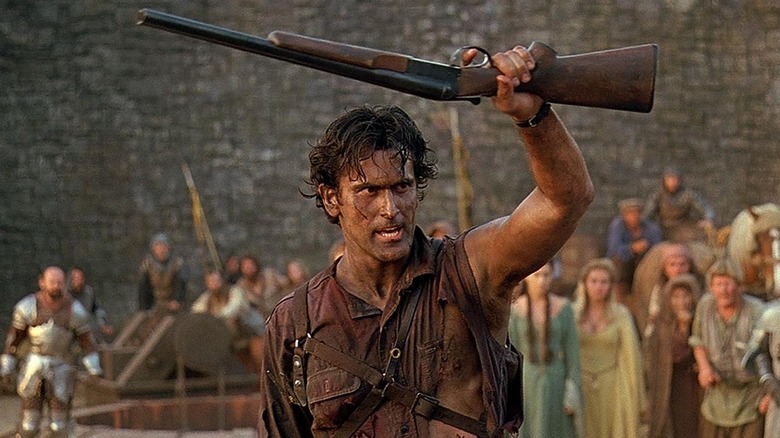Promoting Army Of Darkness Was A Pain In The Neck For Bruce Campbell
If you think two independent, ultra-gory, unrated horror movies getting a big(ger) budget third sequel made by a major Hollywood studio sounds unlikely, then let me remind you of a little movie called "Army of Darkness?" Strange but true — the follow-up to "The Evil Dead" and "Evil Dead 2" (subtitled "Dead By Dawn" if ya nasty) is a lightly-R-rated affair that sees hapless hero Ash (Bruce Campbell) thrust into a fantasized version of the Middle Ages, one that tones down the gushing blood and bodily dismemberment of the prior films before replacing them with rampaging skeletons and exploding catapults ... and it was made by Universal Pictures.
It's a sequel that is equal parts expensive as it is expansive, especially for a franchise that began as the quintessential "cabin in the woods" horror film. In addition to Universal footing the bills for the movie, they were also in charge of distributing and marketing it. That latter aspect caused co-producer and star Campbell extra amounts of grief and frustration, as the studio not only wished to divert the image of "Army of Darkness" away from "Evil Dead," but came up with an ad campaign that had little to no input from the filmmakers.
Sam Raimi gets to make Army of Darkness thanks to Dino De Laurentiis...and Stephen King
Horror guru Stephen King gave the original "The Evil Dead" his public stamp of approval upon its release, allowing director Sam Raimi to garner enough buzz to make a follow-up feature, "Crimewave." When that film became compromised and bombed critically and commercially, Raimi hit upon the idea to make a sequel to "Evil Dead" in order to have creative control again, but could not come up with the financing.
According to a 2015 interview with Raimi, an assistant director on the "Evil Dead 2" team went to work for King while he made "Maximum Overdrive," which was being produced by Dino De Laurentiis. Once the AD mentioned to King that Raimi needed financing, King allegedly spoke to Dino, and De Laurentiis helped finance "Evil Dead 2."
Originally, Raimi had the idea to blast Ash back in time at the start of the sequel but soon realized such a concept would cost more than they had to work with. Instead, he made sure the ending of "Evil Dead 2" set up another sequel that would see Ash in the Middle Ages in a film that he intended to call "Medieval Dead."
Thanks to Raimi having some financial success with "Darkman" (also a Universal Picture) and to De Laurentiis having a multi-picture deal with the studio, "Medieval Dead" was given the go-ahead. When Universal balked at that title, Raimi and company suggested "Evil Dead III: Army of Darkness" (the subtitle allegedly a suggestion of "The Evil Dead" producer Irvin Shapiro), but Universal further insisted that the film drop the "Evil Dead III" name, the first of several cosmetic changes to the movie's marketing.
Universal strong-arms Campbell into an ad campaign
Playing Ash in "Army of Darkness" was tough for Bruce Campbell. Not only did the actor have to keep himself in peak shape during filming, but he had to endure a lot of physical hardship of the necessary and unnecessary varieties (the latter thanks to his and Raimi's infamously antagonistic friendship).
Initially thinking that the completion of principal photography marked the end of his headaches, the filmmakers and Campbell soon found themselves dealing with the prospect of re-cuts and alternate endings, as well as having an ad campaign forced upon them. As Campbell recalled in Bill Warren's 2001 "The Evil Dead Companion," he found that "a couple of reference head shots" he took one day became the basis for a campaign he had no choice but to approve:
"I had no idea what they were doing. I went into a studio, and they said, 'We need a kind of sly look on your face.' So I gave a whole series of stupid shots. Next thing you know, they show me a rough of this Frank Frazetta-like painting. 'We've got to approve it in a day,' they said, 'and if you don't approve it, we don't have an ad campaign.' So what were they telling me? Why did they submit it to me at all? It was frustrating because the lines of communication were not clearly drawn, and things got lost in the shuffle like crazy."
Campbell also pointed out how he, Raimi and producer Rob Tapert were shown a series of television spots that they weren't given time to critique and work on. That said, Campbell made it clear he wasn't singling out Universal so much as bemoaning the way studio filmmaking works. As he explained, "Once you get into the studios, they adopt more the attitude of, 'Thanks, kid. You did a nice movie. We'll take it from here.'"
Hooray for Captain Supermarket
Upon its release in February of 1993 in the US, "Army of Darkness" flopped at the box office, failing to draw in a large crowd of new fans as well as likely confusing those who loved the previous "Evil Dead" films. Fortunately, it became a massive cult hit on home video, rivaling the original "The Evil Dead" for the scrupulous title of Most Editions of a Single Movie Released On Physical Media.
For his part, Campbell rationalized the entire marketing experience as being standard for "the part of the company that promotes the movies," where in studio filmmaking "there's a whole flotilla of junior executives who are terrified to make any hard decisions."
If the actor thought the US ad campaign for "Army of Darkness" was a little off, however, one wonders what he must've thought for the Japanese ads for the film. According to this poster, the film was released in Japan under the title "Captain Supermarket" (a reference to Ashley J. Williams being an employee of the fictional chain store S-Mart), and the poster takes Universal's Frazetta-esque imagery and inserts it into some type of Andy Warhol meets Roy Lichtenstein pop art, with the inclusion of some Campbell's soup cans as a cheeky play on the actor's name to boot. Eat your heart out, Don Draper!



